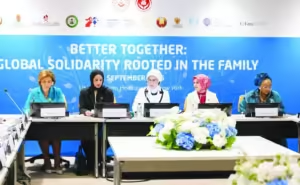A Breakthrough for Women in Qatar Sanctions Flexible Work Schedules for Women for social wellbeing and Family Welfare Systems
Qatar has made a major leap forward in its drive to increase social wellbeing and family welfare systems. Under a newly launched policy, women are eligible to work two hours shorter than men, providing them with greater leeway to strike a balance between professional and family obligations. Working mothers will also be permitted to take early leave during their children’s school exams or holidays—an effort that underscores Qatar’s increasing emphasis on achieving a better work-life balance for women.
This forward-thinking action isn’t simply about working fewer hours; it is an intentional acknowledgment of the pivotal position women occupy in caring for families and serving society in general.

Encouraging Women Outside the Workplace
The policy has a human element that strikes a chord with many working mothers who have to deal with several responsibilities on a daily basis. For most women, mornings and late evenings are already filled up with children’s schooling, home chores, and family care. The new cutback in working hours gives them precious time to invest in both personal and family welfare.
Mothers, especially, will have a sense of comfort during exam periods or school vacations—times when kids need extra care and motivation. By providing mothers with the right to leave early during such periods, Qatar recognizes the emotional and developmental needs of children in addition to professional responsibilities.
Strengthening Family Bonds and Social Values
Qatar’s move represents a larger vision: advancing family values as a core foundation of national development. By providing women with greater flexibility, the policy ensures that families continue to be tight-knit units of support, strength, and care. This not only serves households but also consolidates the social fabric of the country.
The move is also in line with Qatar’s cultural focus on family as a social anchor, so that modernization and development do not compromise on traditional values.
Work-Life Balance as a National Priority
Worldwide, the work-life balance debate has picked up speed, with governments and organizations seeking ways to promote healthier working environments. Qatar’s move is a strong message that employee wellbeing is directly linked to societal wellbeing.
Shortening women’s working hours is anticipated to generate:
- Improved productivity at workplaces, since workers perform better within shorter hours.
- Improved mental health through less burnout and tension.
- Improved family systems where parents can focus time and attention on the development of their children.
This move also sends a message to the world and the region that Qatar is ready to venture into **alternative labor policies** to address changing societal needs.
Reactions and Broader Implications
The declaration has evoked optimistic responses, particularly from working women and families, who see it as a milestone in gender-sensitive policymaking. Employers also stand to gain in the long run, as happy employees are more loyal and driven.
Furthermore, the action puts Qatar among the short list of countries with policies actively aiming to address women’s welfare without undermining their career achievements. It is a reminder that development is not solely about economic development but about human-centered development.
A Model for the Region?
Qatar’s move can be an example to other neighboring countries, fuelling complementary reforms that give more power to women without undermining family ties. As the Gulf nations aim for modernization, such measures demonstrate that economic change and cultural values are not necessarily incompatible.
The new regulation is more than a labor law—it is a declaration of purpose. It states that women are not only economic contributors but also the pillars of solid families and thriving societies.
By scaling back working hours for women and offering flexibility for mothers, Qatar has shown us a visionary future—one where work life and family life are complementary aspects of a balanced society rather than competing forces.
This progressive policy stresses that enabling women is about enabling families and, by extension, enabling the country.
Follow Pakistan Updates for more news and updates.



